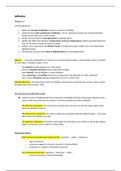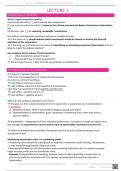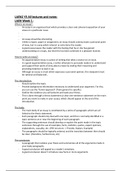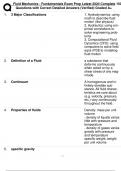Health and Social Care
Unit 5: Meeting individual care and support needs
Learning Aim A: Examine principles, values and skills which underpin meeting the care
and support needs of individuals
Learning Aim B: Examine the ethical issues involved when providing care and support
to meet individual needs
Learning Aim C: Investigate the principles behind enabling individuals with care and
support needs to overcome challenges
, Introduction
This report will show how working practices are used to meet the individual needs of
two individuals. Both case studies show how individuals have needs to be cared for -
one individual has hearing impairments and mental health problems while the other is
shown to be vulnerable, homeless and with visual impairments.
P1 - explain the importance of promoting diversity, equality and
anti-discrimination for individuals with different needs
What is diversity, equality and anti-discrimination?
In relation to health and social care, equality is about ensuring everybody has an equal
opportunity, and is not treated differently or discriminated against because of their
characteristics (1). When in health and social care practices, individuals are likely to be
vulnerable and express some needs. In order to promote equality, it’s important that all
individuals are treated equally and not any different because of characteristics or needs
they may possess.
Similar to this, diversity is about taking account of the differences between people and
groups of people and placing a positive value on those differences (1). It’s
understanding that each individual is unique, and recognising individual differences.
Respecting and valuing diversity means valuing other cultures, beliefs and anything else
that makes an individual differ from one another (9).
Discrimination refers to treating a person unfairly because of who they are or because
they possess certain characteristics, such as age, gender, race, disability, religion,
pregnancy and maternity, sexual orientation, gender reassignment, marriage and civil
partnership (2). Opposite to this, anti-discrimination means treating an individual/group
of individuals unfairly because of a particular characteristic they may possess, such as
gender, disability, age, ethnic origin, skin colour, nationality, sexuality and/or religious
belief. This usually results in negative consequences for the individual(s), reducing
opportunities, excluding them from communities and restricting their ability to contribute
to society (10).
Why is it important for practitioners to promote this?
It’s important for health and social care practitioners to promote practices of equality,
diversity and anti-discrimination. A practitioner must promote and respect an individual’s
differences. Promoting equality and respecting diversity helps to ensure that people are
valued and have the same access to all opportunities regardless of their differences
(11). If a practitioner doesn’t promote practices of diversity for example, it will mean that











